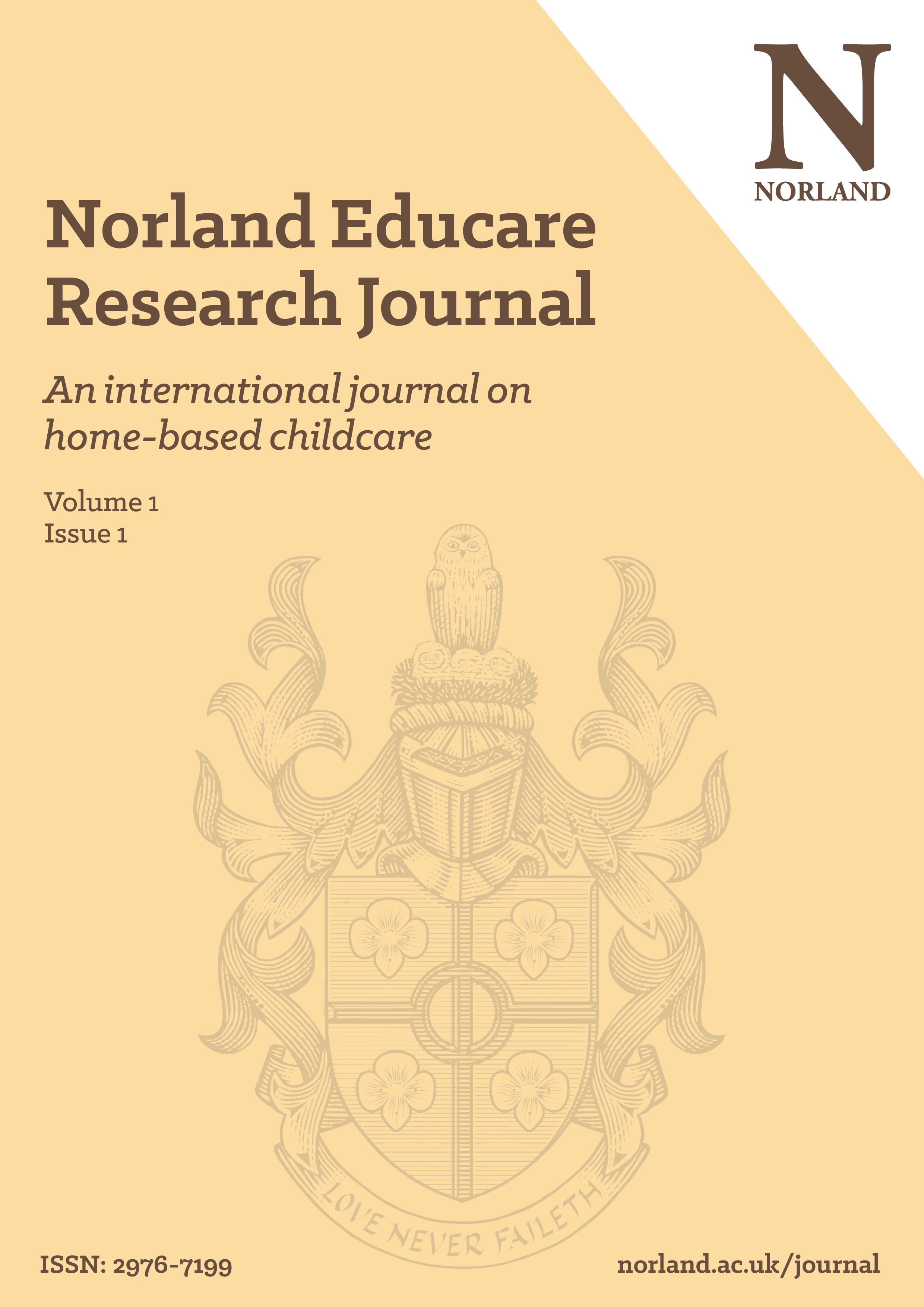The role of home-based childcare in supporting young children’s care, learning and wellbeing
Back to Norland Educare Research Journal
About the journal
Read more about the journalEditorial board
View our editorial boardJournal policies and ethics
View our policies and ethicsPeer review process
View peer review processInformation for readers
Read our information for readersInformation for authors
Read our information for authorsCall for papers
View our call for papersTerms and conditions
View terms and conditionsAbstract
Home-based childcare, or family day care as it is also known, plays an important role in supporting young children’s care and education. It offers early learning opportunities as well as crucial childcare support for working parents, particularly for those with children in the early years. This paper reviews research undertaken over a decade, including the author’s own work and that of other researchers, on the role of home-based childcare in delivering early care and education. Evidence from research in the UK and internationally has consistently shown the positive associations between quality home-based day-care provision and young children’s development (Ang, 2019; Ang et al., 2017; Fauth et al., 2013). Research has also indicated that professional childcare educators working in a home-based setting play a vital role in building strong partnerships with parents and families by offering added social and family support (Garrity and McGrath, 2011). This paper argues that quality home-based childcare, as shown through the evidence base, is an important and unique model of childcare provision that can have a beneficial impact on parents and families as well as on young children’s care, education and overall development.
Keywords: home-based childcare, children, learning, wellbeing, early years
A unique model of childcare and education for young children
Home-based childcare remains a widely used service or provision in many countries, where young children, typically under the age of eight and before primary schooling, are cared for by professional caregivers or educators who work in a home environment, either in the professional’s own or the family’s home, delivering a paid service of care and education for young children. The prevalence of the service, largely used by working parents, has been highlighted in various national reports. In Northern Ireland, for instance, home-based childcare, or childminding as it is commonly known in the country, caters for children aged 0 to 14 years and makes up the most popular and affordable form of full-time childcare, accounting for 61% of full-time day-care places and 39% of all childcare places (Northern Ireland Childminding Association, 2022). In England, home-based childcare encompasses two main provider types or professional groups: childminders, who look after one or more children, usually under the age of eight, in the domestic premises of the childminder’s own home; and nannies, who care for children up to the age of 18 predominantly in the child’s own home. Ofsted, the regulatory body that inspects and regulates all early years and children’s social care services in England, reported that nannies constitute around 1% and childminders approximately 16% of all places on the early years register in the country, although Ofsted’s statistics also indicate a steady decline in the number of childminders since 2016/17 (Ofsted, 2021). In Scotland, national figures show that 32,700 children were registered to receive childcare from childminders in 2018, representing 13% of the overall childcare provision in Scotland (Scottish Government, 2021).
The home-based childcare system is distinct in its unique provision of care and educational experiences for young children in a family-based setting. It is the only day-care service that comes close to replicating a home environment compared to other forms of childcare provision. Comparative research undertaken in England and Japan (Ang and Tabu, 2018) found that a distinctive feature of home-based childcare in both countries is that children are typically cared for in small groups of four to six in a home setting provided by the professional caregiver or educator, and within an ecological system of ‘wrap-around care’ that supports children’s educational, health, social and emotional, and familial needs. To obtain a close insight into this provision, Ang and Tabu (2018) investigated the activities and interactions experienced by children aged four months to four years in five home-based settings through the use of practitioner interviews, narrative observations and document analysis of activity records. While recognising that early childhood systems, including home-based childcare, vary considerably according to country-specific policies and organisational structures, the research interestingly found coherence in home-based services, which provided a form of specialised care and pedagogy that supported children’s educational needs, as well as offering family support (Ang and Tabu, 2018). In both Japan and England, home-based childcare was shown to be important in contributing to the wider childcare ecosystem by providing personalised flexible childcare provision, where children were observed to engage in a rich mix of learning activities and routines with their caregivers that were tailored to the children’s interests and needs.
Close and supportive relationships between home-based caregivers and educators, and children and families
A distinctive feature of home-based childcare is the close and supportive relationships between caregivers and the children and their families. A corpus of international research has shown how home-based childcare provides educators with a unique and vital opportunity not only to support children’s care and education but simultaneously to establish close partnerships with parents and families in their home environment (Mooney and Statham, 2003). Studies have indicated that in some cases, parents of children in home-based childcare are more likely than those with children in centre-based childcare to share personal experiences with educators (Bohanna et al., 2012). For proponents of the service, the personal and dynamic interactions between home-based caregivers, children and families offer a holistic system of provision that ensures continuity and support for children’s care, education and overall development, in a way that the more structured, educationally oriented environment of a day-centre childcare setting is not able to provide as readily. There is also evidence which demonstrates the home-based educator’s ability to build a stable relationship with the child, and a positive educator–parent partnership can promote greater wellbeing for children and educators (Davis et al., 2012).
From research undertaken on Australian family day care, for instance, Triandafilidis et al. (2022) demonstrated that home-based childcare can offer a safe and consistent environment, in which successful partnerships between educators, children and their families significantly benefit children’s mental wellbeing. Educators in the study viewed themselves as advocates and role models for the children they cared for and saw it as their responsibility to communicate with and provide support to parents in supporting the children’s wellbeing (Triandafilidis et al., 2022). In turn, parents and families often viewed home-based professionals as an ‘adviser’ or source of support for their familial needs. This was clearly evident in the observational study of home-based practices in Japan and England, where participants in all five settings in the study offered a personalised and flexible arrangement for parents in managing the daily logistics of childcare, work and family life, including flexible childcare hours and advice on supporting the children’s transition to nursery, as well as on family-related matters (Ang and Tabu, 2018). A study in Ireland reported on home-based caregivers’ enduring and long-term relationships with children and families that were developed over time in a “home-from-home environment” (O’Regan et al., 2019, p. 1).
Professionalising the workforce and building a community of practice for home-based caregivers and educators: challenges and opportunities
An important element in maintaining the quality of home-based childcare services is the professionalising of the workforce through continuous professional development. A recurring theme from the literature is that educators often describe their role in supporting children’s care, education and development as more than “simply looking after children” (O’Regan et al., 2019). A literature review of Flemish, French and German documents on the professionalisation of home-based childcare revealed that the majority of home-based caregivers perceived their professional identity as early years professionals as a development opportunity with a long-term career path, and viewed home-based childcare as a learned and skilled profession (Bauters and Vandenbroeck, 2017).
It is widely recognised that access to professional development opportunities and being part of a professional community of practice will produce a cadre of home-based caregivers who are competent in delivering high-quality care and education for young children (Koh and Neuman, 2009; Ang, 2019). Research by Davis et al. (2012) that explored the experiences of family day-care educators found that home-based educators who regularly interacted with other educators, and had access to professional development opportunities, were more responsive to children’s developmental needs and provided a higher quality of care. Building a community of practice for home-based caregivers is vital to the creation of a sustainable childcare system. Home-based caregivers are known to value partnerships with professionals in local child-related services, as well as with other educators and community organisations. The mutual support shared by caregivers in home-based settings in England and Japan shows how home-based childcare takes place most effectively in a community of practice where caregivers are part of a social network of support with other caregiving groups in the community, such as playgroups and children’s centres, as this enables them to support each other’s practice and engage in knowledge exchange (Ang and Tabu, 2018).
While the profile of the home-based childcare workforce is changing, the sector also faces considerable challenges. Research shows that access to professional development opportunities for home-based caregivers varies, and caregivers get limited professional support while facing the challenge of balancing multiple roles as providers in the wider mixed economy of the childcare system. Studies also show that educators experience a variety of challenges in their role as self-employed home-based educators. While educators in the sector believe they play an important role in supporting children’s education, many also report receiving minimal training, development support and funding (Mooney and Statham, 2003). Triandafilidis et al. (2022) stated that for many home-based caregivers in Australia, balancing roles as a caregiver and a small-business operator can be a significant challenge, with many home-based educators experiencing stress from financial insecurity and difficulties with families. These challenges in turn impact the wellbeing of educators and their capacity to adequately offer quality provision for the children in their care.
Additionally, an evolving social and economic policy context continues to present further challenges for the sector. In the UK, the number of home-based providers is facing an increasing decline, with high turnover rates, reinforced by characteristics such as low pay, a lack of status and recognition, and limited job mobility. In their review of the literature in three regional contexts (Flanders, France and Germany), Bauters and Vandenbroeck (2017) found that structural reforms that were aimed at professionalising the workforce were confined to individual training requirements and professional competence profiles, which had given rise to new regulations on the required training for home-based providers. However, in most cases, this additional training had not altered the status and position of the profession.
The provision of sensitive and high-quality care for children can only be achieved by well-qualified, adequately trained home-based caregivers who have access to regular professional development and training opportunities to enhance their practice. Key questions remain as to what can be done to ensure the long-term sustainability of the home-based childcare system, and how home-based providers who are at the forefront of the service can be adequately supported to deliver the quality of care and education that most benefits young children.
Concluding reflections
In our current society and pandemic-affected world, the need for quality childcare and education has vastly increased, and the care and wellbeing of children must take precedence. We know from established research that high-quality early childhood care and education is beneficial for children in the short and longer term. The unique nature of home-based childcare needs to be further researched and documented to strengthen the evidence base for the benefits of childminding, especially in terms of improving children’s care, learning and wellbeing outcomes. It is also important to identify validated measures that can effectively capture the quality of home-based childcare environments and practices, in order to inform a care and education system for young children that is supportive, sustainable and well regulated.
Acknowledgements
As Norland celebrates its 130th anniversary year, I am honoured to contribute this research paper for the inaugural issue of the Norland Educare Research Journal. The research by the author on home-based childcare that was referenced in this paper (Ang, 2019; Ang and Tabu, 2018; Ang et al., 2017) was supported by funding from the Daiwa Foundation and the UK Economic and Social Research Council. It is hoped that this paper will inform further debates and reflections on the important role of home-based childcare and research-informed practice in this vital area of work.
Declaration of authorship and conflict-of-interest statement
The author confirms that this is their own work and there are no known conflicts of interest, financial or non-financial, associated with this publication.
References
Ang, L. (2019) ‘Supporting children’s learning and development in childminding or home-based child care’, in S. Hupp and J. D. Jewell (eds) The encyclopedia of child and adolescent development. USA: Wiley-Blackwell.
Ang, L. and Tabu, M. (2018) ‘Conceptualising home-based child care: a study of home-based settings and practices in Japan and England’, International Journal of Early Childhood, 50(2), pp. 143–158.
Ang, L., Brooker, E. and Stephen, C. (2017) ‘A review of the research on childminding: understanding children’s experiences in home-based childcare settings’, Early Childhood Education Journal, 45(2), pp. 261–270.
Bauters, V. and Vandenbroeck, M. (2017) ‘The professionalisation of family day care in Flanders, France and Germany’, European Early Childhood Education Research Journal, 25(3), pp. 386–397.
Bohanna, I., Davis, E., Corr, L., Priest, N. and Tan, H. (2012) ‘Family day care in Australia: a systematic review of research (1996–2010)’, Australasian Journal of Early Childhood, 37(4), pp. 138–146.
Davis, E., Freeman, R., Doherty, G., Karlsson, M., Everiss, L., Couch, J., Foote, L., Murray, P., Modigliani, K., Owen, S., Griffin, S., Friendly, M., McDonald, G., Bohanna, I., Corr, L., Smyth, L., Mørkeseth, E. I., Morreaunet, S., Ogi, M., Fukukawa, S. and Hinke-Rahnau, J. (2012) ‘An international perspective on regulated family day care systems’, Australasian Journal of Early Childhood, 37(4), pp. 127–137.
Fauth, R., Owen, S. and Jelicic, H. (2013) The next best thing to being at home: parents’ views of quality in home-based childcare settings. Research Summary 10. National Children’s Bureau Research Centre. Available at: www.ncb.org.uk/resources/all-resources/filter/early-years/next-best-thing-being-homewww.ncb.org.uk/resources/all-resources/filter/early-years/next-best-thing-being-home (Accessed: 20 March 2019).
Garrity, S. and McGrath, B. (2011) ‘“It’s not like a job now; it’s part of me”: exploring African women’s experiences in the Irish childcare sector’, Child Care in Practice, 17(1), pp. 69–86.
Koh, S. and Neuman, S. (2009) ‘The impact of professional development in family child care: a practice-based approach’, Early Education and Development, 20(3), pp. 537–562.
Mooney, A. and Statham, J. (eds) (2003) Family day care: international perspectives on policy, practice and quality. London, New York: Jessica Kingsley Publishers.
Northern Ireland Childminding Association (2022) News release. Available at: https://nicma.org/getattachment/Home/Final-Press-Release-NICMA-July-23rd.pdf.aspx?lang=en-GB (Accessed: 12 June 2022).
Ofsted (2021) Main findings: childcare providers and inspections as at 31 August 2021. Available at: www.gov.uk/government/statistics/childcare-providers-and-inspections-as-at-31-august-2021/main-findings-childcare-providers-and-inspections-as-at-31-august-2021 (Accessed: 12 June 2022).
O’Regan, M., Halpenny, A. M. and Hayes, N. (2019) ‘Childminding in Ireland: attitudes towards professionalisation’, European Early Childhood Education Research Journal, 27(6), pp. 757–775.
Scottish Government (2021) Our commitment to childminding in Scotland. Available at: www.gov.scot/binaries/content/documents/govscot/publications/strategy-plan/2021/01/commitment-childminding-scotland/documents/commitment-childminding-scotland/commitment-childminding-scotland/govscot%3Adocument/commitment-childminding-scotland.pdf (Accessed: 12 June 2022).
Triandafilidis, Z., Old, A., Hanstock, T. and Fitzpatrick, S. (2022) ‘Family day care educators’ ability to support children’s mental wellbeing and the impact of COVID-19’, Journal of Early Childhood Research, 20(4), pp. 510–523. Available at: https://doi.org/10.1177/1476718X221089565
Related articles
Front matter and content page: Norland Educare Research Journal
The Norland Educare Research Journal is an international double-blind peer-reviewed journal, published annually, online only. It is an open access journal, offering free-of-charge publication to researchers and authors, and free...
Editorial – Home-based educarers: powerful agents who cannot be neglected!
Home-based childcare, in the form of childminding and nannying, is a vital service to families (Ang et al., 2017). It is mainly used by families, such as those in rural...
Useful links and information for the Norland Educare Research Journal
About the journal
Read more about the journalEditorial board
View our editorial boardJournal policies and ethics
View journal policies and ethicsInformation for readers
View information for readersInformation for authors
View information for authorsCall for papers
View call for papersTerms and conditions
View terms and conditions



Translate this page